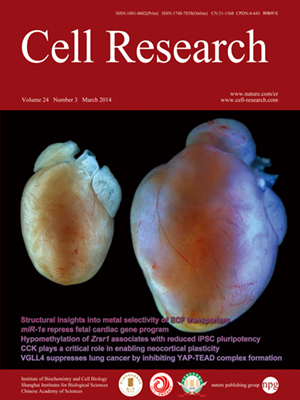
Volume 24, No 3, Mar 2014
ISSN: 1001-0602
EISSN: 1748-7838 2018
impact factor 17.848*
(Clarivate Analytics, 2019)
Volume 24 Issue 3, March 2014: 293-306
ORIGINAL ARTICLES
High-throughput sequencing reveals the disruption of methylation of imprinted gene in induced pluripotent stem cells
Gang Chang1,2,*, Shuai Gao1,2,*, Xinfeng Hou2, Zijian Xu2, Yanfeng Liu3, Lan Kang2, Yu Tao2, Wenqiang Liu2, Bo Huang2, Xiaochen Kou2, Jiayu Chen2, Lei An1, Kai Miao1, Keqian Di1, Zhilong Wang1, Kun Tan1, Tao Cheng3, Tao Cai2, Shaorong Gao2 and Jianhui Tian1
1Ministry of Agriculture Key Laboratory of Animal Genetics, Breeding and Reproduction, National Engineering Laboratory for Animal Breeding, College of Animal Sciences and Technology, China Agricultural University, 2 Yuanmingyuan West Road, Haidian District, Beijing 100193, China
2National Institute of Biological Sciences, 7 Science Park Road, Zhongguancun Life Science Park, Beijing 102206, China
3State Key Laboratory of Experimental Hematology, Institute of Hematology and Blood Diseases Hospital, Chinese Academy of Medical Sciences and Peking Union Medical College, Nanjing Road, Tianjin 300020, China
Correspondence: Jianhui Tian, Tel: 86-10-62896057; Fax: 86-10-62733856 E-mail: tianjh@cau.edu.cn; Shaorong Gao, Tel: 86-10-80728967; Fax: 86-10-80727535(gaoshaorong@nibs.ac.cn)
It remains controversial whether the abnormal epigenetic modifications accumulated in the induced pluripotent stem cells (iPSCs) can ultimately affect iPSC pluripotency. To probe this question, iPSC lines with the same genetic background and proviral integration sites were established, and the pluripotency state of each iPSC line was characterized using tetraploid (4N) complementation assay. Subsequently, gene expression and global epigenetic modifications of “4N-ON” and the corresponding “4N-OFF” iPSC lines were compared through deep sequencing analyses of mRNA expression, small RNA profile, histone modifications (H3K27me3, H3K4me3, and H3K4me2), and DNA methylation. We found that methylation of an imprinted gene, Zrsr1, was consistently disrupted in the iPSC lines with reduced pluripotency. Furthermore, the disrupted methylation could not be rescued by improving culture conditions or subcloning of iPSCs. Moreover, the relationship between hypomethylation of Zrsr1 and pluripotency state of iPSCs was further validated in independent iPSC lines derived from other reprogramming systems.
10.1038/cr.2013.173
FULL TEXT | PDF
Browse 2166


